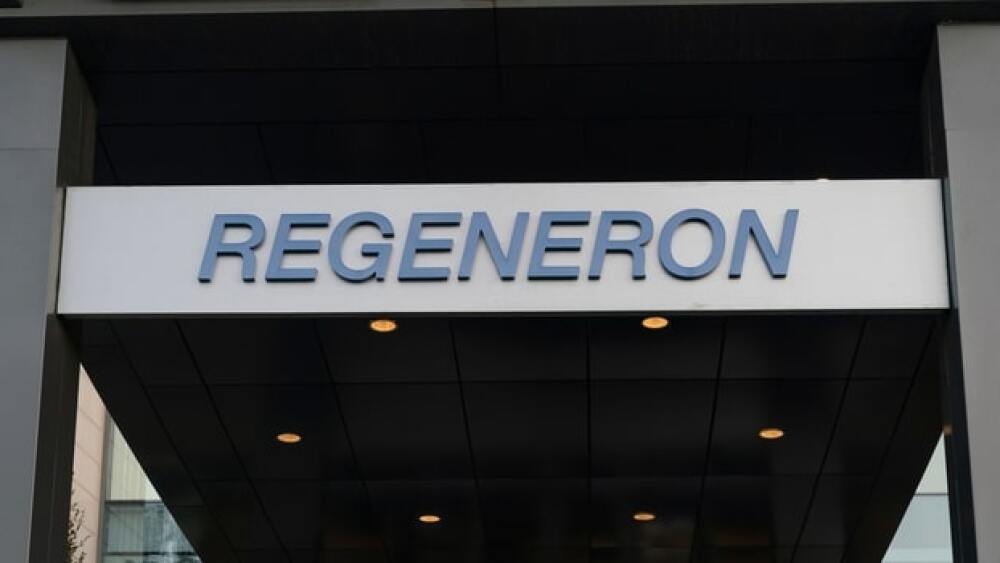The New York–based biotech will present data from a Phase I trial of 98 patients showing that fianlimab combined with Libtayo led to an overall response rate of 61% in advanced melanoma.
Pictured: Regeneron logo on building/Lev Radin/Shutterstock
Since the March 2022 FDA approval of Bristol Myers Squibb’s Opdualag in metastatic melanoma, biopharma companies have been chasing immuno-oncology’s latest hot target, immune checkpoint receptor LAG-3. Now, Regeneron appears to be pulling away from the pack.
Ahead of the 2023 American Society of Clinical Oncology (ASCO) Annual Meeting, the New York–based biotech reported results from a Phase I study of LAG-3 inhibitor fianlimab in combination with Libtayo (cemiplimab), a PD-1 inhibitor, in advanced melanoma, showing an overall response rate (ORR) of 61% across three cohorts. This nearly doubles the response rates seen with anti-PD-1 monotherapy in similar settings, the company stated in a Thursday announcement.
It is also better than the 43% ORR seen in 355 patients who received BMS’ Opdualag over 19.3 months in its registrational trial.
The new results build on data from a Phase III study, presented at the European Society of Medical Oncology (ESMO) Congress in September 2022, where the fianlimab–Libtayo combo elicited overall response rates of up to 65% in advanced melanoma.
Omid Hamid, director of clinical research and immunotherapy at The Angeles Clinic and Research Institute, said in a statement that it was “particularly encouraging” to see clinical activity in patients with a poor prognosis or those who had already received treatment with an anti-PD-1 therapy in an adjuvant setting.
Regeneron is touting the results as a win, despite two possible caveats: The positive results were from a small trial of 98 patients with unresectable or metastatic melanoma, and a significant number of those patients—16%—dropped out of the trial due to adverse events that included rash, hypothyroidism, adrenal insufficiency and myalgia.
The data will be presented on June 5 at ASCO. On June 3, Regeneron will present data from a Phase III trial of the fianlimab/Libtayo combo compared to Merck’s Keytruda in patients with previously untreated unresectable locally advanced or metastatic melanoma, and Phase III data from the duo versus Keytruda in completely resected high-risk melanoma.
An Emerging I-O Target
“The next big kid on the block is LAG-3,” Israel Lowy, senior vice president of clinical sciences and head of translational science and oncology at Regeneron, told Fierce Biotech.
Inhibiting the LAG-3 gene can make PD-1 inhibitors like Libtayo and Keytruda work in more patients. When the immune system develops a primary or secondary resistance to anti-PD-1 therapy, LAG-3 inhibitors can come in behind them, LAG-3 pioneer Frédéric Triebel told BioSpace in a previous interview. Triebel is the chief scientific officer at Immutep, which describes itself as the world’s only pure-play LAG-3 company.
On May 17, Immutep announced that its eftilagimod alpha (efti) combined with Keytruda showed “robust initial overall survival” in first-line non-small cell lung cancer. Treatment with Efti led to an overall survival rate of 25 months in patients with at least 1% PD-L1 expression, Immutep reported.
Heather McKenzie is a senior editor at BioSpace, focusing on neuroscience, oncology and gene therapy. You can reach her at heather.mckenzie@biospace.com. Follow her on LinkedIn and Twitter @chicat08.
Featured Jobs on BioSpace






